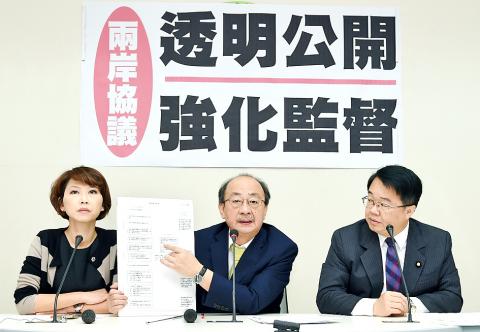The Democratic Progressive Party (DPP) caucus yesterday released a draft bill on monitoring cross-strait negotiations and agreements — without a clause that would let an agreement come into effect automatically if the review process stalls.
After meeting for more than two hours, DPP caucus members decided on a proposal for a bill to monitor cross-strait exchanges that would allow the legislature to intervene before, during and after a cross-strait negotiation and the signing of a cross-strait deal.
“After thorough discussions at the caucus meeting, [caucus members] have reached an agreement on a version [of the bill to monitor cross-strait talks and agreements] that would give the legislature the authority to intervene before, during and after negotiations,” DPP caucus whip Ker Chien-ming (柯建銘) told a news conference in Taipei following the meeting. “This is a mechanism that we have never had in the past.”

Photo: Liao Chen-huei, Taipei Times
Ker said that according to the proposal, the executive branch must report to the legislature prior to any negotiations with a detailed negotiation plan, including national security checks and the effect negotiations could have.
During talks, the proposal would require the government to report to the legislature when the two sides reach an initial consensus or would like to implement major changes to a proposal, with the talks only being able to resume with the legislature’s consent, Ker said.
“The most important part of the proposal is that a draft agreement must undergo a clause-by-clause review by the legislature,” he said.
Following talks, the government should report the outcome to the legislature and the negotiations can be stopped if there are any problems, he added. “In other words, the executive branch must have the authorization of the legislature for any phase of negotiations and before signing an agreement.”
A clause saying the legislature would have up to 90 days to review a draft agreement and 30 days for a signed agreement, with a possible extension of 10 days — but if the legislature fails to approve the deal by the deadline the agreement would automatically take effect — did not appear in the final draft.
The clause was dubbed the “Chang Ching-chung clause,” because former Chinese Nationalist Party (KMT) legislator Chang Ching-chung (張慶忠) had insisted that the cross-strait service trade agreement should automatically take effect according to the Act Governing the Exercise of Legislative Power (立法院職權行使法) after it sat idle at the legislature for three months.
The DPP boycotted a review of the agreement in 2014.
When asked about the clause, DPP caucus secretary-general Chen Ting-fei (陳亭妃) denied it had been “removed,” because “there was never a Chang Ching-chung clause.”
Caucus members “made different proposals and some of those never made it to the final phase, why would there be any controversy?” Chen said.

AIR SUPPORT: The Ministry of National Defense thanked the US for the delivery, adding that it was an indicator of the White House’s commitment to the Taiwan Relations Act Deputy Minister of National Defense Po Horng-huei (柏鴻輝) and Representative to the US Alexander Yui on Friday attended a delivery ceremony for the first of Taiwan’s long-awaited 66 F-16C/D Block 70 jets at a Lockheed Martin Corp factory in Greenville, South Carolina. “We are so proud to be the global home of the F-16 and to support Taiwan’s air defense capabilities,” US Representative William Timmons wrote on X, alongside a photograph of Taiwanese and US officials at the event. The F-16C/D Block 70 jets Taiwan ordered have the same capabilities as aircraft that had been upgraded to F-16Vs. The batch of Lockheed Martin

GRIDLOCK: The National Fire Agency’s Special Search and Rescue team is on standby to travel to the countries to help out with the rescue effort A powerful earthquake rocked Myanmar and neighboring Thailand yesterday, killing at least three people in Bangkok and burying dozens when a high-rise building under construction collapsed. Footage shared on social media from Myanmar’s second-largest city showed widespread destruction, raising fears that many were trapped under the rubble or killed. The magnitude 7.7 earthquake, with an epicenter near Mandalay in Myanmar, struck at midday and was followed by a strong magnitude 6.4 aftershock. The extent of death, injury and destruction — especially in Myanmar, which is embroiled in a civil war and where information is tightly controlled at the best of times —

Taiwan was ranked the fourth-safest country in the world with a score of 82.9, trailing only Andorra, the United Arab Emirates and Qatar in Numbeo’s Safety Index by Country report. Taiwan’s score improved by 0.1 points compared with last year’s mid-year report, which had Taiwan fourth with a score of 82.8. However, both scores were lower than in last year’s first review, when Taiwan scored 83.3, and are a long way from when Taiwan was named the second-safest country in the world in 2021, scoring 84.8. Taiwan ranked higher than Singapore in ninth with a score of 77.4 and Japan in 10th with

China's military today said it began joint army, navy and rocket force exercises around Taiwan to "serve as a stern warning and powerful deterrent against Taiwanese independence," calling President William Lai (賴清德) a "parasite." The exercises come after Lai called Beijing a "foreign hostile force" last month. More than 10 Chinese military ships approached close to Taiwan's 24 nautical mile (44.4km) contiguous zone this morning and Taiwan sent its own warships to respond, two senior Taiwanese officials said. Taiwan has not yet detected any live fire by the Chinese military so far, one of the officials said. The drills took place after US Secretary